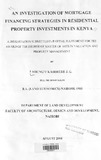An investigation of mortgage financing strategies in residential property investments in Kenya

View/
Date
2001Author
Ndung'u, Kaberere JG
Type
ThesisLanguage
enMetadata
Show full item recordAbstract
Residential Mortgage Financing in Kenya has been pegged to the performance of the
economy. The key determinants or index' of the performance by the mortgage
financing companies (MFC) -like Housing Finance Company of Kenya Ltd (HFCK)
and Savings ant' Loan Kenya Ltd (S&L)- have been the prevailing interest rates in
the markets. The Kenyan economy has been very unstable since the early 1990's and
interest rates have been very volatile.
Interest rates on mortgages have been as high as 32%. This has resulted to interest
payable on loans to amount to the initial principal sum advanced within a few years.
For long term borrowing, as is the case of residential mortgages, this is not
sustainable nor does it encourage borrowing. Property returns have been on the
decline for the last 4 years, which compounds the situation.
Lenders have not addressed the relationship between them and the borrowers with a
view to tackling the constraints that confront the two parties. Instead they have only
addressed their problems of profit maximisation. For the relationship of the lenders
and borrowers to be sustainable and to grow, the financing system has to be
somewhat equitable to both lenders and borrowers. .
The state has played a very minimal role in provision and stabilising of housing
financing not withstanding the fact that housing is a basic human right. Following the
liberalisation if the economy and banking sector in 1991, interest rates were only
technically deregulated, as the relevant Banking Law was not amended. This
however resulted to the lenders charging whatever interest they deemed adequate to
meet their prof] maximisation goals.
Sponsorhip
University of NairobiPublisher
University of Nairobi Department of Land Development
